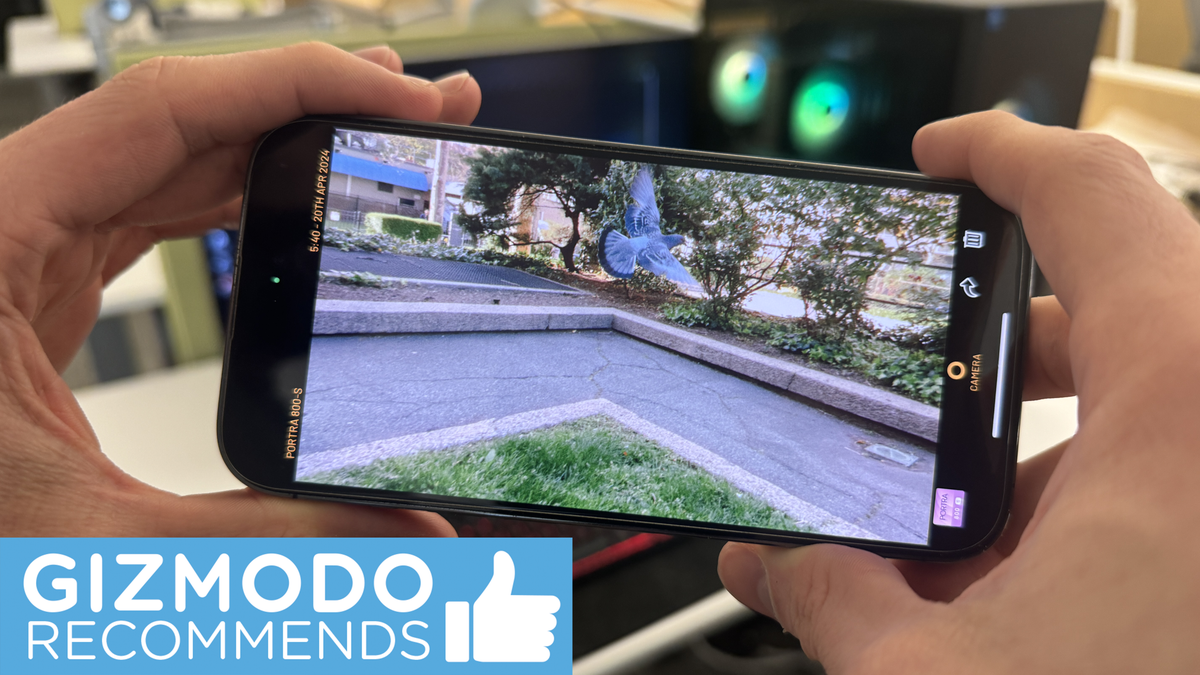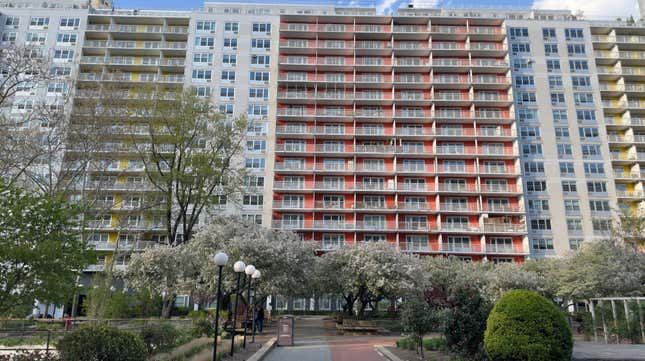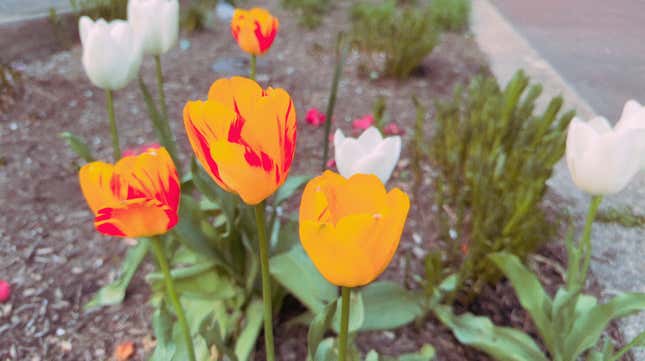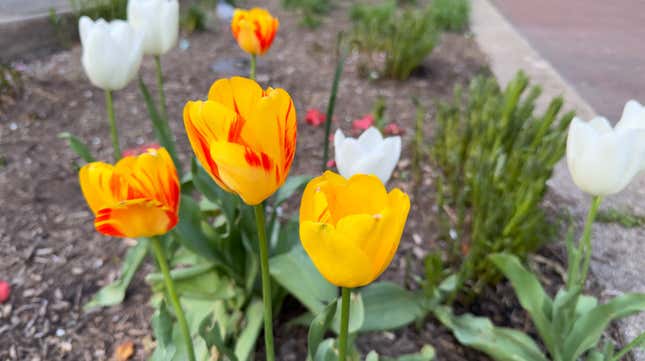No matter your composition, the lighting, and your attempts to manually set zoom or exposure, iPhone pictures all still have the same dull quality. They are not dull in the sense they’re not vibrant or detailed, but by default, with the “Standard” photo style, they’re all using the same obtuse post-processing that blooms certain colors while boosting the sharpness and depth of field. They’re not bad photos by any stretch, and they easily manage to compete with the latest Pixel phones and their excellent camera. And yet, they’re still boring. Even the different tonality settings don’t actually change the quality of the shot.
Of course, there’s an app for that—quite a few, in fact. I’ve been testing out the app called Mood over the past few weeks. It’s made me addicted to snapping quick pictures on my commutes and walking around New York City. App developer Alex Fox hit me up a few weeks ago after seeing I reviewed the Fujifilm X100VI. The app is relatively simple. Just as Fuji’s modern shooters allow for photo simulations, such as 35mm film stock analogs, Mood captures a RAW photo from the phone’s sensor before Apple’s algorithms modify them. It applies a color profile and other “filmic effects” including grain, chromatic aberration, fade, and halation. To sum it up, it automatically makes your photos look like they came out of a scrapbook from real old-school film cameras without many of the overused distortion or empty light artifacts you get in many other faux-physical photo apps.
Mood Made Taking Springtime Photos Extra Vibrant?
Mood has proved to be one of my favorite apps for taking pictures of budding springtime blooms. In the small parks surrounding NYU, I snapped some shots of extra-vibrant yellow tulips and the multicolored tenement blocks with the “Vista” filter that helped give extra preference to the trees beneath. As the pink Magnolia flowers punched their little heads out to feel this month’s solar eclipse, I captured the Mood’s “Apollo” filter to add a lot more yellow to the budding leaves and further emphasize the color of the flowers. You can also set it to capture the RAW file simultaneously with the modified version to compare directly. In many cases, I even prefer the unaltered photo to Apple’s usual post-processing.
“Initially I wanted to emulate real films but after some experimentation I found it a bit too restrictive, there wasn’t enough variation for my vision,” Fox told me over email. The app creator added that many of the filters are inspired by today’s existing ones. In addition, a few other “fictional” stocks like Vista do more to enhance in-frame greenery. You can also modify how much grain is applied to the photos and adjust the tone and contrast with two simple sliders. It’s so easy I almost wish there were a few more options to fine-tune the film grain and artifacts truly, but it also means the app is extremely easy for anybody with an iPhone to get into.
Of course, the app has limitations. Currently, the maximum resolution it captures is 12 MP. Even though I’m shooting with an iPhone 14 Pro, I can’t make use of the 48 MP main sensor. It’s not a terrible blow, as most shots on the latest iPhones are set at 12 MP, and you have to manually set the iPhone camera to RAW Max settings to get those high-res photos. Fox said he hopes to integrate 48 MP capture, perhaps even a portrait mode, one day. When you get the app, you have a seven-day free trial before you’re asked to cough up $15 for lifetime access or else pay $2 a month. That’s not extreme by many photo app’s standards, but it is a consideration if you don’t think you’ll be using the app much, save for the occasional funky shot when the moment arises.
VSCO and RetroCam
Personally, I’m far less fond of apps that ask you to do all the post-processing work after you take the photo, so quality apps like VSCO, which also allows you to lay filters over existing photos, or RetroCam, which can apply glitches and other pseudo-filmic effects to your existing gallery, aren’t really as appealing. Both are pretty good in their own right, but to get immediate results, you’re better off with Mood or another faux-film app.
But I’ll admit my fondness for the app, and simply experimenting with different filters on the same subject is sometimes more fun than breaking out my DSLR or fine-tuning a heavy-duty digital shooter. Then again, I’ve caught the old-school camera bug, and I’ve also been delving through more apps that make
What App Works Best for a Disposable Camera Experience?
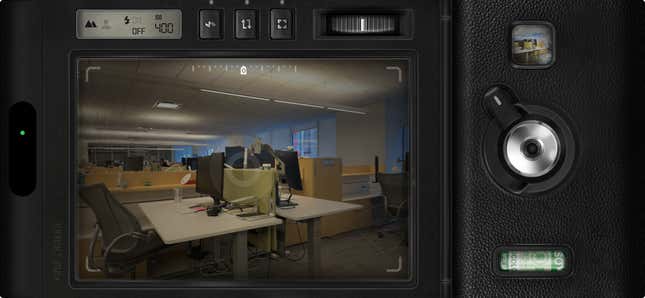
If you want more camera controls, you can always turn on the ‘Pro’ features for the latest phones, and sure, the iPhone 15 Pro can take 3D Spatial Video. Still, the joys of actual photography come down to the precise nature of every kind of body or lens, whether it’s a DSLR, mirrorless, digital, or even film camera. The idiosyncrasies of each camera brand, the fine-tuning of each lens, and even the points of failure make shooting enjoyable. Something about not knowing the outcome of the shot before you take it adds to the joy of photography.
Huji
There are plenty of apps that try to recreate that sense of uncertainty. Huji was one of the first and most baseline faux-disposable camera apps available on iOS. It’s so simple that you literally have no other options other than the flash toggle, looking at the pinhole viewfinder, and hitting the shutter button. The app applies a thick layer of grain and film distortion on the created images and a fake timestamp at the bottom. While nostalgia might try to convince you that all photos were like that back then, it’s still a little much, especially if you’re taking photos outside.
Kamon and FIMO
There are plenty of copycats as well. Of those trying to reproduce old disposables, my personal favorite is Kamon. The app includes a host of different “rolls” to make your photos appear as they came out of an old Insta camera or some other old-school instant-photo brand. You can set it so that every photo has a frame like it was printed out on photo stock. Still, I find it a little much and not very helpful for anything but novelty photos. Other apps like 1998 Cam are also far too overt, but I found FIMO a great middle ground, especially with its cute faux-leather app UI and relatively clean output that still includes fun timestamps. You have a selection of different film types that offer different effects on your photos, though you need to pay for a subscription in order to get full access to the different types.
The point is that plenty of apps can change how you take photos on an iPhone. Mood may be one of the better ones I’ve tried, but my advice is to try your hand at several and select the one you like best. I’m not the arbiter of quality photos by any stretch, but if the point is to have fun, ignore the default camera app and try to be a little adventurous.

